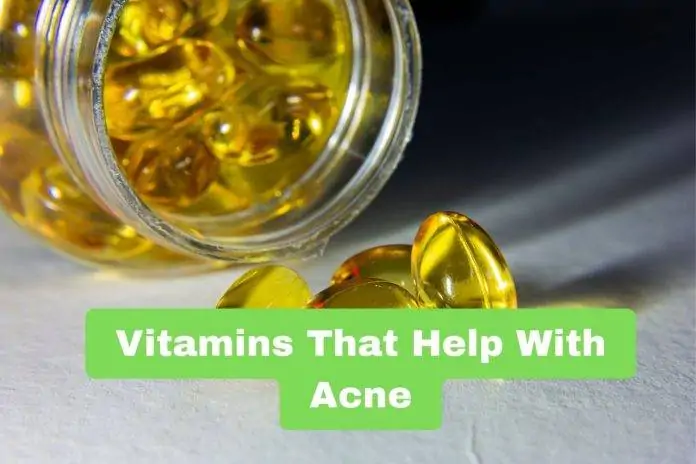If you’ve been struggling with acne, there are several Vitamins that help with Acne you can take that will help. They include Vitamin A, C, D, and Omega-3 fatty acids. You’ll also want to look into Probiotics, Selenium, and Zinc.
Vitamin A
Vitamin A helps with acne by preventing inflammation and dead skin cells. It encourages the production of new skin cells and prevents them from sticking together. As a result, the skin may become smoother and brighter.
It also acts as an antioxidant. Free radicals can damage the skin, leading to inflammation and breakouts. To combat this, vitamin A is one of the vitamins that can be taken orally or applied topically.
Topical formulas contain retinol, a form of vitamin A, that helps heal the skin. These formulas can be found in creams, lotions, and serums.
Vitamin C
Vitamin C helps with acne by boosting your immune system and fighting off oxidative stress. The best vitamin C supplements are oil-free serums, which also contain ingredients that soothe and moisturize the skin.
It’s a powerful antioxidant that boosts collagen production. Collagen is a protein that strengthens the skin, promotes healing, and helps to turn over dead skin cells.
Free radicals, on the other hand, are unstable molecules that cause cell damage. Inflammation is the body’s response to this stress.
Vitamin C’s anti-inflammatory properties help reduce acne and its scars. Research indicates that vitamin C may also be effective at treating pustules, the red, bumpy lesions that can form on your face.
Vitamin D
Vitamin D is an important part of healthy skin. It helps to protect skin from damage caused by acne, unclogs pores and reduces inflammation.
The best way to increase vitamin D levels is through diet. However, it can also be obtained from sun exposure. People with acne-prone skin should limit their sun exposure. If they can’t avoid it, they should take a vitamin D supplement.
Vitamin D also has antimicrobial properties. This may be useful in fighting bacteria that cause acne. Another benefit is its ability to scavenge free radicals. These radicals weaken cell structure and contribute to the formation of acne.
Zinc
Zinc is a very important mineral for your health. It has many benefits, including the ability to fight acne. You can get zinc in your diet, through your food, or by taking a supplement. However, you should consult a doctor before incorporating a supplement into your daily routine.
One of the most common forms of zinc is zinc gluconate. This is a key ingredient in a number of cold and cough remedies.
Zinc also has anti-inflammatory properties. In addition, it can help prevent the growth of acne-causing bacteria.
Another important role of zinc is in wound healing. Zinc helps to halt the over-production of keratinocytes. These cells are responsible for bindin skin cells together.
Selenium
Selenium is a powerful antioxidant that can help with acne. It can also boost immune function, reduce inflammation, and protect against free radical damage.
There are many antioxidants in foods and in dietary supplements. These include vitamins A, C, E, and zinc. Antioxidants are known to be the best defense against oxidation.
Selenium is a member of a group of minerals called trace elements. They are naturally present in small amounts in our bodies, but they perform several vital functions. Among the various trace elements are iron, manganese, and copper.
Selenium is an essential mineral in the body. It is important for thyroid, reproductive, and immune system function.
Omega 3
Omega 3 Vitamins may help acne, but it’s not an overnight solution. You will need to consult your dermatologist or health care provider before starting a new regimen. Besides, omega-3s can interact with other medications and should be taken with caution.
Omega-3 fatty acids can be found in fish oil, krill oil, and algae oil. They reduce inflammation and may decrease the amount of breakouts you experience.
A recent study showed that omega-3 fish oil supplements can be effective in reducing the severity of acne. The supplement’s properties fight inflammation and keep your skin hydrated. It may also prevent future breakouts by closing the infected pores.
Probiotics
When considering vitamin supplements for acne, it is a good idea to make sure that they contain probiotics. These microorganisms are known to be good for your skin and your health in general. They also help with digestion and are a great way to boost your immune system.
For those with acne, it may help to use a product that contains a combination of live and synthetic probiotics. The best way to find a probiotic is to look for one that has a clinically-proven blend.
In addition to boosting your immune system and digestion, probiotics can reduce inflammation in your skin. Some of these strains can be found in fermented foods like kefir, miso, and yogurt. Other products that incorporate probiotics are cleansers, moisturizers, and serums.




